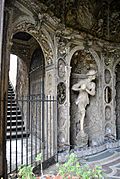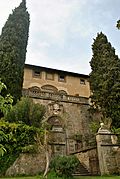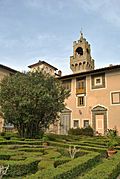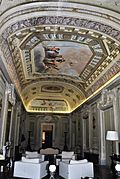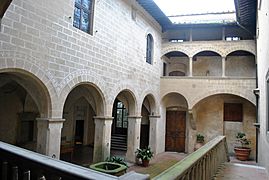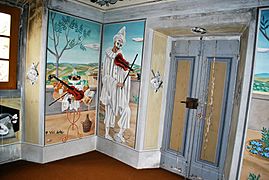Osbert Sitwell facts for kids
Quick facts for kids
Osbert Sitwell
|
|
|---|---|
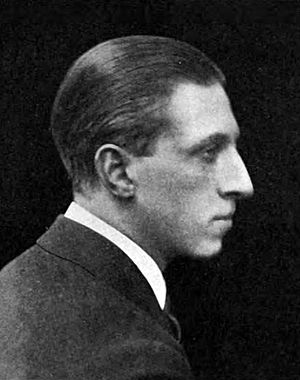 |
|
| Born | Francis Osbert Sacheverell Sitwell 6 December 1892 London, England |
| Died | 4 May 1969 (aged 76) near Florence, Italy |
| Occupation | Writer |
| Education | Eton College |
| Period | 1919–1962 |
| Partner | David Stuart Horner |
| Parents | George Sitwell Lady Ida Denison |
| Relatives | Edith Sitwell (sister) Sacheverell Sitwell (brother) |
Sir Francis Osbert Sacheverell Sitwell (born December 6, 1892 – died May 4, 1969) was an English writer. He was known for his poetry, novels, and his long autobiography. Osbert was part of a famous family of writers, including his older sister Edith Sitwell and younger brother Sacheverell Sitwell. All three of them loved and worked in the world of art and literature.
Contents
Early life and education
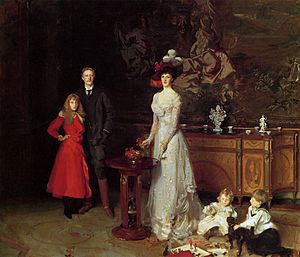
Osbert Sitwell was born in London, England. He grew up in his family's grand home, Renishaw Hall, in Derbyshire. He also spent time at their homes near Scarborough.
For his schooling, Osbert went to Ludgrove School and then to Eton College. He often joked that he learned more during his school holidays than he did at Eton!
In 1911, he joined the Sherwood Rangers Yeomanry, which was a cavalry unit. However, he soon realized he wasn't suited to be a cavalry officer. He then moved to the Grenadier Guards at the Tower of London. This new role allowed him to visit theaters and art galleries in his free time.
Time in the Army
In late 1914, Osbert's peaceful life changed when he was sent to the trenches in France, near Ypres in Belgium. This difficult experience led him to write his very first poems. He described it as a strong feeling that made him want to write. His first poem, "Babel," was published in The Times newspaper in May 1916.
Around the same time, he started working on literary projects with his brother and sister. They became known as "the Sitwells" and were famous for their artistic collaborations.
Interests and public life
Osbert Sitwell had many interests beyond writing. In 1917, he was the best man at the wedding of Alexander, the 1st Marquess of Carisbrooke, who was a royal family member.
In 1918, Osbert left the Army as a Captain. He then tried to become a politician, running as a candidate for the Liberal Party in the Scarborough and Whitby area. He finished second in the election.
Later in his life, Osbert became interested in preserving old buildings. He strongly supported keeping Georgian buildings safe. He even helped save Sutton Scarsdale Hall, a historic building now looked after by English Heritage. He was also an early member of the Georgian Group, which works to protect such buildings.
Osbert also had a fascination with the paranormal. He joined the Ghost Club, a group that met to discuss strange and unexplained events.
Writing career and famous works
Osbert Sitwell spent his life writing poetry, critiquing art, and writing articles that sometimes caused debate. He and his brother helped fund an art show that featured works by famous artists like Matisse, Utrillo, Picasso, and Modigliani.
He also supported the composer William Walton. Walton's famous musical piece, Belshazzar's Feast, was written using words provided by Osbert.
Osbert published two books of poems: Argonaut and Juggernaut (1919) and At the House of Mrs Kinfoot (1921). In the mid-1920s, he met David Stuart Horner, who became his close friend and companion for most of his life.
His books
Osbert's first fiction book, Triple Fugue, came out in 1924. After traveling to Italy and Germany, he wrote Discursions on Travel, Art and Life (1925).
His first novel, Before the Bombardment (1926), was set in a hotel during the quiet season. Critics really liked it. One reviewer called it "a nearly flawless piece of satirical writing."
He wrote several other novels, including Miracle on Sinai (1934) and Those Were the Days (1937). He also published a collection of short stories called Open the Door (1940) and another novel, A Place of One's Own (1940). His Selected Poems (1943) and a book of essays, Sing High, Sing Low (1944), were also well-received. In 1951, he published "The Four Continents," a book about travel and memories.
Rat Week poem
Osbert Sitwell was a good friend of the Duke and Duchess of York, who later became King George VI and Queen Elizabeth. In December 1936, when King Edward VIII decided to give up his throne, Osbert wrote a poem called Rat Week.
The poem criticized some people who had been friends with King Edward VIII but then turned away from him. Because of its strong opinions, the poem was not published right away. However, Osbert made sure it was shared privately among people.
Later, a part of the poem appeared in a magazine, but it left out some of the more controversial parts. Osbert sued the magazine because they published his work without his full permission and changed it. He won the case, and the poem gained more attention.
Osbert knew the full poem couldn't be published while he was alive because it might upset people. So, he decided it should wait even longer to avoid causing pain to those still living. The complete poem was finally published in 1986, many years after his death.
His autobiography
In 1943, Osbert began writing his autobiography, which is a story of his own life. It became a series of four books: Left Hand, Right Hand (1943), The Scarlet Tree (1946), Great Morning (1948), and Laughter in the Next Room (1949).
The first book includes a funny story about the famous painter John Singer Sargent and his group portrait of the Sitwell family. The writer George Orwell said that Osbert's autobiographies were "among the best autobiographies of our time."
After his autobiography, Osbert wrote a collection of essays about people he had known, called Noble Essences: A Book of Characters (1950). He also wrote a final book of memories, Tales my Father Taught Me (1962).
Osbert once described his career by saying that for 30 years, he and his brother and sister had fought against "Philistines" (people who don't appreciate art or culture). He said that even though they were outnumbered, they sometimes managed to make a difference.
Awards and honors
Osbert Sitwell received several important honors for his work. He was made a Commander of the Order of the British Empire (CBE) in 1956. Two years later, in 1958, he became a Companion of Honour (CH).
Baronetcy
When Osbert's father passed away in 1943, Osbert inherited the title of baronet. This meant he became Sir Osbert Sitwell, 5th Baronet.
Later life and death
From the 1950s, Osbert Sitwell suffered from Parkinson's disease, a condition that affects movement. By the mid-1960s, his illness became so severe that he could no longer write.
He passed away on May 4, 1969, in Italy. He died at Montegufoni, a castle near Florence that his father had bought and restored.
The castle was left to his nephew, Reresby. Osbert's money was left to his brother, Sacheverell. Osbert was cremated, and his ashes were buried in the Cimitero Evangelico degli Allori in Florence. A copy of his first novel, Before the Bombardment, was buried with him.
Gallery of Montegufoni
See also
 In Spanish: Osbert Sitwell para niños
In Spanish: Osbert Sitwell para niños
 | Valerie Thomas |
 | Frederick McKinley Jones |
 | George Edward Alcorn Jr. |
 | Thomas Mensah |


